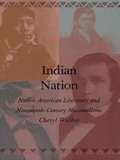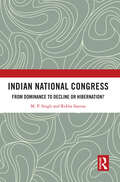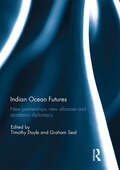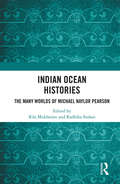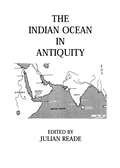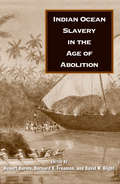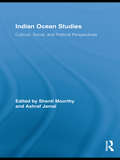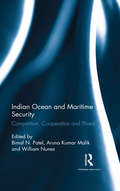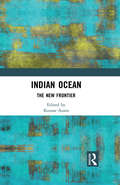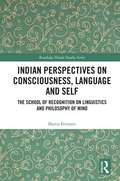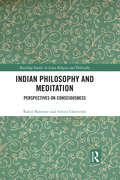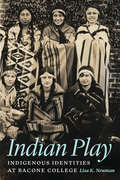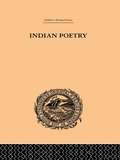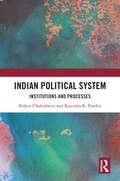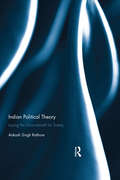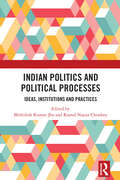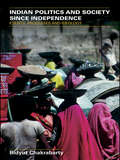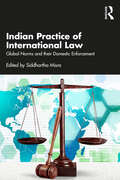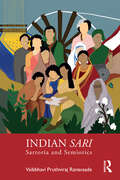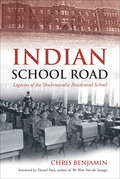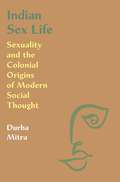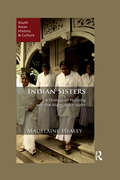- Table View
- List View
Indian Nation: Native American Literature and Nineteenth-Century Nationalisms
by Cheryl WalkerIndian Nation documents the contributions of Native Americans to the notion of American nationhood and to concepts of American identity at a crucial, defining time in U.S. history. Departing from previous scholarship, Cheryl Walker turns the "usual" questions on their heads, asking not how whites experienced indigenous peoples, but how Native Americans envisioned the United States as a nation. This project unfolds a narrative of participatory resistance in which Indians themselves sought to transform the discourse of nationhood.Walker examines the rhetoric and writings of nineteenth-century Native Americans, including William Apess, Black Hawk, George Copway, John Rollin Ridge, and Sarah Winnemucca. Demonstrating with unique detail how these authors worked to transform venerable myths and icons of American identity, Indian Nation chronicles Native American participation in the forming of an American nationalism in both published texts and speeches that were delivered throughout the United States. Pottawattomie Chief Simon Pokagon's "The Red Man's Rebuke," an important document of Indian oratory, is published here in its entirety for the first time since 1893. By looking at this writing through the lens of the best theoretical work on nationality, postcoloniality, and the subaltern, Walker creates a new and encompassing picture of the relationship between Native Americans and whites. She shows that, contrary to previous studies, America in the nineteenth century was intercultural in significant ways.
Indian National Congress: From Dominance to Decline or Hibernation?
by Rekha Saxena M. P. SinghThis book presents a systematic analysis of the rise and decline of the Indian National Congress since 1980s, using the frame dominance to hibernation. The Indian National Congress (INC or Congress Party) originated in the national movement for India`s freedom and has since been the centerpiece of post-Independence multiparty system for nearly four decades. However, the Congress has been experiencing a phase of serious decline since the 2014 and 2019 General Elections. Analyzing years of political history and contemporary developments, this volume brings to the fore important issues and key themes such as, • Evolution of party system in India, the contemporary dynamics and movements; • Indian National Congress under Indira Gandhi and Rajiv Gandhi; • Ideological and policy reorientation of the party in 1990s under P. V. Narsimha Rao; • Revival of mass membership and organizational elections in the party; • Indian National Congress in the 2000s, under the leadership of Sonia Gandhi and Rahul Gandhi; • The 2019 debacle and change in the leadership. A comprehensive work on the history of the Congress Party in India, this volume will be an essential read for scholars and researchers of political science, party politics, Indian politics, sociology, modern Indian history, political sociology, public administration, public policy, South Asian studies, and governance studies.
Indian Ocean Futures: New Partnerships, New Alliances, and Academic Diplomacy
by Graham Seal Timothy DoyleIndian Ocean studies, which once lagged behind studies of the Atlantic and the Pacific, is an important emerging academic field which has come into its own. In the next fifty years, the Indian Ocean Region will become very significant as a result of enormous demographic changes. What was the Ocean of the South is rapidly becoming the Ocean of the Centre, the Ocean of the Future. Curtin University, Western Australia, has a long and distinguished history of engagement with the Indian Ocean region and with Indian Ocean Studies, and its Australia-Asia-Pacific Institute of Curtin University continues to maintain a focus on the Indian Ocean -past, present and future. This book examines a number of themes emerging from its 2014 Conference entitled "Indian Ocean Futures", which attracted some of the best Indian Ocean region scholars. The conference connected humanities, social sciences and scientific disciplines; this book collects some of the preeminent works focused on geo-strategic, cultural, environmental security and human security themes. The book is also an important contribution to the building of academic diplomacy in the region – that is to say, it contributes to region-building by creating epistemic communities and networks between government, the private sector, and academia throughout the region. Through the pursuit of academic diplomacy, academics are capable of pursuing research goals which enhance governmental, business, and civil society objectives of the day. This book was previously published as a special issue of the Journal of the Indian Ocean Region.
Indian Ocean Histories: The Many Worlds of Michael Naylor Pearson
by Radhika Seshan Rila MukherjeeThis book offers a global history of the Indian Ocean and focuses on a holistic perspective of the worlds of water. It builds on maritime historian Michael Naylor Pearson’s works, his unorthodox approach and strong influence on the study of the Indian Ocean in viewing the oceanic space as replete with human experiences and not as an artefact of empire or as the theatre of European commercial and imperial transits focused only on trade. This interdisciplinary volume presents several ways of writing the history of the Indian Ocean. The chapters explore the changing nature of Indian Ocean history through diverse themes, including state and capital, regional identities, maritime networking, South Asian immigrants, Bay of Bengal linkages, the East India Company, Indian seamen, formal and informal collaboration in imperial networking, scientific transfers, pearling, the issues of colonial copyright, customs, excise and port cities. The volume will be useful to scholars and researchers of global history, modern history, maritime history, medieval history, Indian history, colonial history and world history.
Indian Ocean In Antiquity
by ReadeFirst published in 1996. Routledge is an imprint of Taylor & Francis, an informa company.
Indian Ocean Slavery in the Age of Abolition
by David W. Blight Robert W. Harms Bernard K. FreamonWhile the British were able to accomplish abolition in the trans-Atlantic world by the end of the nineteenth century, their efforts paradoxically caused a great increase in legal and illegal slave trading in the western Indian Ocean. Bringing together essays from leading authorities in the field of slavery studies, this comprehensive work offers an original and creative study of slavery and abolition in the Indian Ocean world during this period. Among the topics discussed are the relationship between British imperialism and slavery; Islamic law and slavery; and the bureaucracy of slave trading.
Indian Ocean Studies: Cultural, Social, and Political Perspectives (Routledge Indian Ocean Series)
by Shanti Moorthy Ashraf JamalThe Indian Ocean is famously referred to as the "cradle of globalization," as it facilitated cultural and economic exchanges between Africa, the Arab world, the Indian subcontinent, Southeast Asia, and China, for 5000 years prior to European presence in the region. As this ocean's significance has gained increasing attention from scholars in recent years, few have examined the 'human' dimensions in Indian Ocean exchanges. Including the work of historians, geographers, anthropologists and literary analysts, each essay in this volume addresses a specific human factor, such as the fate of the creole in the Bay of Bengal, creolization as a globalized phenomenon, migrancy and diaspora, the lives of seafarers then and now, and the lives of those who inhabit the ocean's littoral. This volume is a necessary addition to the field of Indian Ocean studies.
Indian Ocean and Maritime Security: Competition, Cooperation and Threat
by Bimal N. Patel Aruna Kumar Malik William NunesThis book provides a synoptic view of the Indian Ocean and maritime security in its contested waters. Using a historical approach, it reveals vital links to events in the present day. The volume: Highlights the competition between major Asian powers to control the ‘String of Pearls’ — a reference to the Chinese attempts at controlling the Indian Ocean periphery. Shows that cooperation amongst the major powers of the region could abate the threat of the potential of conflict becoming global and inviting external intervention. Discusses India’s Look-East policy and the deepening relation between India and the Association of Southeast Asian Nations (ASEAN). Argues for the need of Indian Ocean states and particularly the South Asian Association for Regional Cooperation (SAARC) members of the Indian Ocean Rim Association (IORA) to look afresh at their political and security issues and common interests. Suggests measures for evolving a robust mechanism of maintaining the Indian Ocean as a sustainable zone of commerce, energy, security and peace rather than threat. A major contribution on a critical area in Asian geopolitics, this volume will be useful to scholars and researchers of international relations, politics, defence studies and maritime security studies, along with strategic affairs experts and think tanks.
Indian Ocean: The New Frontier
by Kousar J. AzamThe present volume curates papers presented at an international conference organized at OUCIP to engage with the oceanic turn in different fields of knowledge embracing Social Sciences, Humanities and, Physical Sciences to project the Indian Ocean as the new frontier of research across various disciplines. The papers are divided into four sections: The Oceanic Reach has papers reflecting on the received knowledge regarding the historical role and reach of the Indian Ocean and providing new insights in the evolving dynamics of the region.The section on Literature and Culture has essays reflecting the different trajectories within Humanities and Cultural Studies through which Indian Ocean has stimulated the imagination of scholars, intellectuals, diasporic writers, and culture historians.The section on Roots and Routes includes accounts of the historical, cultural, religious, trade and diasporic linkages across oceanic communities inhabiting the vast expanse of the Indian Ocean.The final section on Power Games includes papers that deal with the increasing interests of various international powers in the Indian Ocean region particularly in the context of the shift from the Asian land mass to the enormous presence of the Indian Ocean, and the economic, political and strategic significance that it has for the entire region.Taken together these contributions offer both an opportunity and a challenge for interested scholars to engage with Indian Ocean as a new frontier of knowledge with enormous potential for research and exploration. Please note: Taylor & Francis does not sell or distribute the Hardback in India, Pakistan, Nepal, Bhutan, Bangladesh and Sri Lanka
Indian Perspectives on Consciousness, Language and Self: The School of Recognition on Linguistics and Philosophy of Mind (Routledge Hindu Studies Series)
by Marco FerranteThis book examines the theory of consciousness developed by the school of Recognition, an Indian philosophical tradition that thrived around the tenth c. CE in Kashmir, and argues that consciousness has a linguistic nature. It situates the doctrines of the tradition within the broader Indian philosophical context and establishes connections with the contemporary analytic debate. The book focuses on Utpaladeva and Abhinavagupta (tenth c. CE), two Hindu intellectuals belonging to the school of Recognition, Pratyabhijñā in Sanskrit. It argues that these authors promoted ideas that bear a strong resemblance with contemporary ‘higher–order theories’ of consciousness. In addition, the book explores the relationship between the thinkers of the school of Recognition and the thought of the grammarian/philosopher Bhartṛhari (fifth c. CE). The book bridges a gap that still exists between scholars engaged with Western traditions and Sanskrit specialists focused on textual materials. In doing so, the author uses concepts from contemporary philosophy of mind to illustrate the Indian arguments and an interdisciplinary approach with abundant reference to the original sources. Offering fresh information to historians of Indian thought, the book will also be of interest to academics working on Non-Western Philosophy, Comparative Philosophy, Indian Philosophy, Religion, Hinduism, Tantric Studies and South Asian Studies.
Indian Philosophy and Meditation: Perspectives on Consciousness
by Rahul Banerjee Amita ChatterjeeIndia has a rich tradition of meditative practices designed to study the phenomenon of consciousness. From the distant past to the present, India has evolved a unique psychological culture with grand unifying themes and universal modes of meditative practice. This book provides a detailed analysis of classical and modern Indian views on consciousness along with their related meditative methods. It offers a critical analysis of three distinct trends of Indian thought, viz., a dualistic mode of understanding and realizing consciousness in Hindu Sāṃkhya, an interactive mode in early Buddhist abhidhamma, and the evolutionary transformational mode in the teachings of the twentieth-century sage Sri Aurobindo. This book explores the unifying features in Indian first person practices with regard to consciousness and the importance of these applied psychological practices and their associated understanding of our conscious inner lives. The most striking feature of the work is that side by side theoretical exposition of consciousness, it includes a number of worksheets which explain how to use meditation to achieve relaxation as well as cognitive ‘maps’ of the different levels of conscious states and instruction and how one can traverse from one state to another. The final chapter explores Sri Aurobindo who introduced new and decisive Indian spiritual thought and practice to India in the form of Integral Yoga. This innovative book will be of interest to scholars studying Indian philosophy, Indian religion and the emerging field of contemplation studies.
Indian Play: Indigenous Identities at Bacone College
by Lisa K. NeumanWhen Indian University—now Bacone College—opened its doors in Indian Territory (now Oklahoma) in 1880, it was a small Baptist institution designed to train young Native Americans to be teachers and Christian missionaries among their own people and to act as agents of cultural assimilation. From 1927 to 1957, however, Bacone College changed course and pursued a new strategy of emphasizing the Indian identities of its students and projecting often-romanticized images of Indianness to the non-Indian public in its fund-raising campaigns. Money was funneled back into the school as administrators hired Native American faculty who in turn created innovative curricular programs in music and the arts that encouraged their students to explore and develop their Native identities. Through their frequent use of humor and inventive wordplay to reference Indianness—&“Indian play&”—students articulated the (often contradictory) implications of being educated Indians in mid-twentieth-century America. In this supportive and creative culture, Bacone became an &“Indian school,&” rather than just another &“school for Indians.&”In examining how and why this transformation occurred, Lisa K. Neuman situates the students&’ Indian play within larger theoretical frameworks of cultural creativity, ideologies of authenticity, and counterhegemonic practices that are central to the fields of Native American and indigenous studies today.
Indian Poetry
by Edward ArnoldFirst published in 2000. Routledge is an imprint of Taylor & Francis, an informa company.
Indian Political System: Institutions and Processes
by Bidyut Chakrabarty Rajendra K. PandeyThis volume examines the distinct structural characteristics of Indian politics and unearths significant sociopolitical and economic processes which are critical to the political articulation of governance in the country. It reflects on the foundational values of Indian polity, the emergence of the nation post-colonialism, the structural fluidity of federalism in India, and the changing nature of the planning process in the country. The book also studies the electoral processes, social movements, party system, local and state governance. Apart from analyzing corruption and public grievance systems, the volume also probes into significant issues in Indian politics. This book will be useful to the students, researchers and faculty working in the field of political science, public administration, political sociology, political economy and post-colonial contemporary Indian politics in particular. It will also be an invaluable and interesting reading for those interested in South Asian studies.
Indian Political Theory: Laying the Groundwork for Svaraj
by Aakash Singh RathoreAt present, a nativist turn in Indian political theory can be observed. There is a general assumption that the indigenous thought to which researchers are supposed to be (re)turning may somehow be immediately visible by ignoring the colonization of the mind and polity. In such a conception of svaraj (which can be translated as ‘authentic autonomy’), the tradition to be returned to would be that of the indigenous elites. In this book, this concept of svaraj is defined as a thick conception, which links it with exclusivist notions of spirituality, profound anti-modernity, exceptionalistic moralism, essentialistic nationalism and purism. However, post-independence India has borne witness to an alternative trajectory: a thin svaraj. The author puts forward a workable contemporary ideal of thin svaraj, i.e. political, and free of metaphysical commitment. The model proposed is inspired by B.R. Ambedkar's thoughts, as opposed to the thick conception found in the works of M.K. Gandhi, KC Bhattacharya and Ramachandra Gandhi. The author argues that political theorists of Indian politics continue to work with categories and concepts alien to the lived social and political experiences of India's common man, or everyday people. Consequently, he emphasises the need to decolonize Indian political theory, and rescue it from the grip of western theories, and fascination with western modes of historical analysis. The necessity to avoid both universalism and relativism and more importantly address the political predicaments of ‘the people’ is the key objective of the book, and a push for a reorientation of Indian political theory. An interesting new interpretation of a contemporary ideal of svaraj, this analysis takes into account influences from other cultures and sources as well as eschews thick conceptions that stifle imaginations and imaginaries. This book will be of interest to academics in the fields of philosophy, political science, sociology, literature and cultural studies in general and contemporary political theory, South Asian and Indian politics and political theory in particular.
Indian Politics and Political Processes: Ideas, Institutions and Practices
by Mithilesh Kumar Jha Kamal Nayan ChoubeyIndian Politics and Political Processes explores the key ideas, foundations, continuities, major shifts and challenges to the state and democracy in modern India. The book presents an in-depth analysis of recent issues and challenges confronting the Indian state and politics. Presenting a comprehensive account of the major trajectories of Indian politics, this book introduces the readers to the existing literature and enables them to think critically about major issues and institutions of politics and democracy. The chapters engage critically with the historical antecedents, major debates, and recent developments. The book also elaborately deals with issues such as populism, religious movements, minority rights, health, and the environment, which are often ignored or side-lined in the available literature on Indian politics and political processes. The book will be useful to the students, teachers and researchers pursuing courses in political science, South Asian Studies, and international/global politics and economics. It will also be an informative read for those interested in contemporary South Asian politics.
Indian Politics and Society since Independence: Events, Processes and Ideology
by Bidyut ChakrabartyFocusing on politics and society in India, this book explores new areas enmeshed in the complex social, economic and political processes in the country. Linking the structural characteristics with the broader sociological context, the book emphasizes the strong influence of sociological issues on politics, such as social milieu shaping and the articulation of the political in day-to-day events. Political events are connected with the ever-changing social, economic and political processes in order to provide an analytical framework to explain ‘peculiarities’ of Indian politics. Bidyut Chakrabarty argues that three major ideological influences of colonialism, nationalism and democracy have provided the foundational values of Indian politics. Structured thematically and chronologically, this work is a useful resource for students of political science, sociology and South Asian studies.
Indian Practice of International Law: Global Norms and their Domestic Enforcement
by Siddhartha MisraThis book engages with different aspects of India’s practice of international law. It covers a diverse range of areas such as human rights, humanitarian law, migration, diplomacy, extradition, environment, trade, investment, taxation, cyberspace, data protection, maritime, and intellectual property to showcase India’s strong commitment to respect and observe international law.The volume discusses various themes which include: Legal and constitutional framework; Air, space, and atomic energy; Environment; Sea and maritime law; Trade, investment, and taxation; Conflict of laws; IT and data protection; Human rights and humanitarian law; Issues of refugees and internally displaced persons; Extradition and diplomatic immunities; Intellectual property; International obligations. The essays in this book also establish the linkage between observance of international law and bilateral and multilateral relations between different countries.Comprehensive and analytical, this book will be useful for scholars and researchers of law, international law, human rights, and foreign policy. It will also be an invaluable companion for professionals in law firms and think tanks, bureaucrats, and diplomats.
Indian Sari: Sartoria and Semiotics
by Vaibbhavi Pruthviraj RanavaadeThe sari has remained an essential part of culture, tradition and fashion in South Asia and India through many centuries. This book examines the variety of meanings which it carries as a symbol of Indian femininity and tradition as well as a means of creative fashion expression for modern India. It discusses the semiotic interpretations of the sari today by understanding its significance for traditional weavers, designers and people who wear saris at home, work or for religious or cultural occasions. Through surveys, interactions and interviews, the author explores the shared experience of wearing saris in different social and cultural settings across economic groups in farms and boardrooms as well as a means of creative expression for young Indians. It also looks at the processes involved in making traditional saris today, draping and weaving styles, buying behaviour, saris in pop-culture, pride parades and Bollywood and interpretations of what the sari signifies in different socio-economic circles in India. This book will be of interest to students of fashion, design, fashion business, history and cultural studies. It will also be useful for professionals working in the fashion industry and designers.
Indian School Road: Legacies of the Shubenacadie Residential School
by Chris BenjaminThe scandalous history of neglect, abuse, and exploitation at a residential school for children—and the ongoing effects in the decades since it closed.In Indian School Road, journalist Chris Benjamin tackles the controversial and tragic history of Canada’s Shubenacadie Indian Residential School, its predecessors, and its lasting effects, giving voice to multiple perspectives for the first time. Benjamin integrates research, interviews, and testimonies to guide readers through the varied experiences of students, principals, and teachers over the school’s nearly forty years of operation, from 1930 to 1967, and beyond. Exposing the raw wounds of the twenty-first-century Truth and Reconciliation Commission, as well as the struggle for an inclusive Mi’kmaw education system, Indian School Road is a comprehensive and compassionate narrative history of the school that uneducated hundreds of Aboriginal children.
Indian Sex Life: Sexuality and the Colonial Origins of Modern Social Thought
by Durba MitraDuring the colonial period in India, European scholars, British officials, and elite Indian intellectuals—philologists, administrators, doctors, ethnologists, sociologists, and social critics—deployed ideas about sexuality to understand modern Indian society. In Indian Sex Life, Durba Mitra shows how deviant female sexuality, particularly the concept of the prostitute, became foundational to this knowledge project and became the primary way to think and write about Indian society.Bringing together vast archival materials from diverse disciplines, Mitra reveals that deviant female sexuality was critical to debates about social progress and exclusion, caste domination, marriage, widowhood and inheritance, women's performance, the trafficking of girls, abortion and infanticide, industrial and domestic labor, indentured servitude, and ideologies about the dangers of Muslim sexuality. British authorities and Indian intellectuals used the concept of the prostitute to argue for the dramatic reorganization of modern Indian society around Hindu monogamy. Mitra demonstrates how the intellectual history of modern social thought is based in a dangerous civilizational logic built on the control and erasure of women's sexuality. This logic continues to hold sway in present-day South Asia and the postcolonial world.Reframing the prostitute as a concept, Indian Sex Life overturns long-established notions of how to write the history of modern social thought in colonial India, and opens up new approaches for the global history of sexuality.
Indian Sisters: A History of Nursing and the State, 1907–2007 (South Asian History and Culture)
by Madelaine HealeyHealth and medicine cannot be understood without considering the role of nurses, both as professionals and as working women. In India, unlike other countries, nurses have suffered an exceptional degree of neglect at the hands of state, a situation that has been detrimental to the quality of both rural and urban health care. Charting the history of the development of nursing in India over 100 years, Indian Sisters examines the reasons why nurses have so consistently been sidelined and excluded from health care governance and policymaking. The book challenges the routine suggestion that nursing’s poor status is mainly attributable to socio-cultural factors, such as caste, limitations on female mobility and social taboos. It argues instead that many of its problems are due to an under-achieved relationship between a patriarchal state on the one hand, and weak professional nursing organisations shaped by their colonial roots on the other. It also explores how the recent phenomenon of large-scale emigration of nurses to the West (leading to better pay, working conditions and career prospects) has transformed the profession, lifting its status dramatically. At the same time, it raises questions about the implications of emigration for the fate of health care system in India. An important contribution to the growing academic genre of nursing history, the book is essential reading for scholars and students of health care, the history of medicine, gender and women’s studies, sociology, and migration studies. It will also be useful to policymakers and health professionals.
